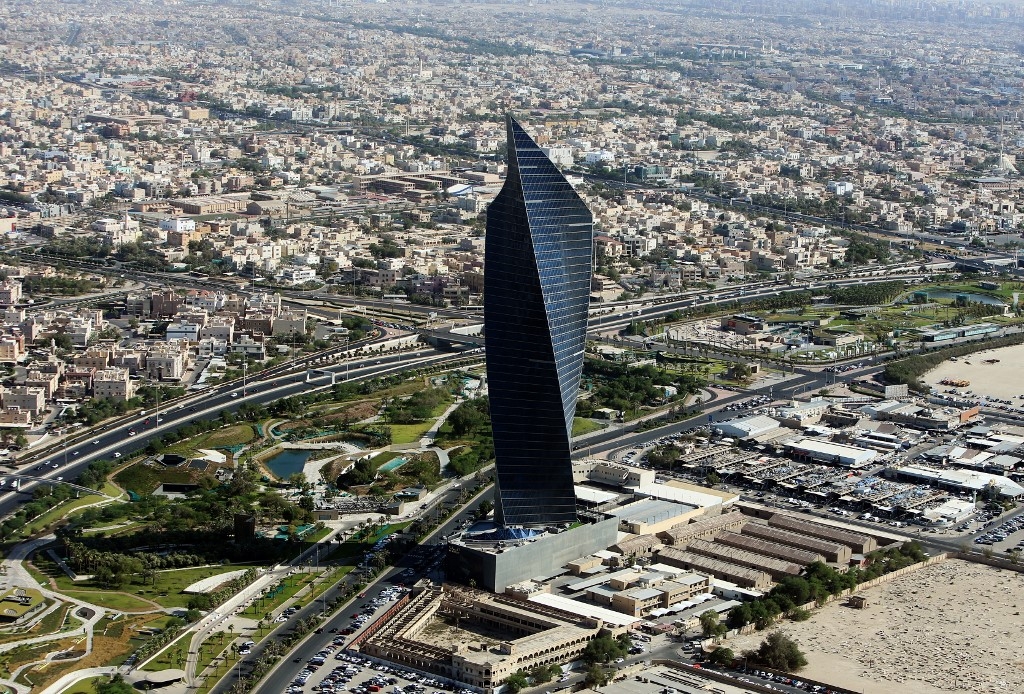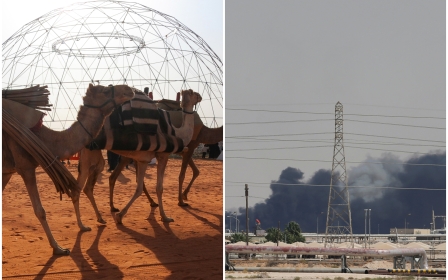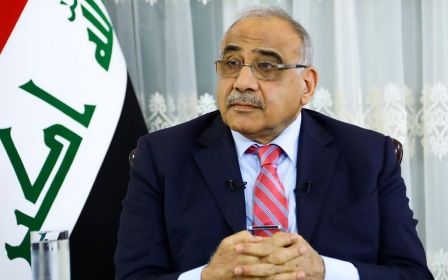'What is happening behind the scenes?' Drone sighting stokes alarm in Kuwait

Members of Kuwait's parliament on Monday urged the country's government to step up security and military preparations following an attack on oil facilities in neighbouring Saudi Arabia and reports that drone aircraft involved in the attacks may have passed through Kuwaiti airspace.
A three-metre-long drone was reportedly seen flying over Kuwait's capital early on Saturday, shortly before Saudi Aramco's two key facilities of Abqaiq and Khurais in eastern Saudi Arabia were set ablaze in what have been described as drone attacks.
Yemen's Houthi rebels initially claimed responsibility for the attack, but an Iraqi intelligence source told Middle East Eye that the attack had been carried out by Iranian drones launched from southern Iraq.
On Monday, the Iraqi prime minister denied that his country had been used to launch the attack, while the Wall Street Journal cited US officials saying that the attack was launched from Iran.
Drone seen over palace
Stay informed with MEE's newsletters
Sign up to get the latest alerts, insights and analysis, starting with Turkey Unpacked
Kuwait's government said on Sunday it was investigating reported sightings of an unmanned plane which local Al-Rai newspaper said was seen hovering over the Dar Salwa presidential palace.
The newspaper said the device dropped to a low altitude of 250 metres over the palace, hovered near the eastern beach of Al-Bidaa, before heading towards the capital Kuwait City.
In video of an incident recorded early on Saturday morning and posted on Twitter, a Kuwaiti citizen says he saw three flying objects hovering over Kuwait's eastern coast after flying in from the north.
"This one is heading to Saudi Arabia. It came from the north. There it is. Here it is," he is heard saying as an audible rumbling can be heard in the background.
The camera then zooms in although it is impossible to make out any detail in the darkness. But the man describes the flying objects as "looking like two missiles, not planes," adding "there were three small planes, unmanned, before these. They're too small, barely seen".
Mohammed al-Dallal, a member of Kuwait's parliament, said in a statement that the drones cutting through Kuwait's airspace were a "major violation", and that the damage done to Saudi's oil industry is "not far from Kuwait".
He called on the government to intensify security measures to secure the country's territories.
Meanwhile, lawmaker Riyadh al-Adasani was quoted by Al-Jarida newspaper as saying that the government's statement in response to the reports indicated its lack of readiness in tackling such risks.
The government "should have dealt with this issue right away, and involved authorities should've been alert to any urgent security situation," he said.
Oil-rich Kuwait has mostly sought to avoid involvement in the Gulf region's geopolitical rivalries, and the country's ruler, Sheikh Sabah al-Ahmed Al-Sabah, has long mediated in regional disputes.
Although a resident of Dar Salwa palace, he has been in the US since early September and was scheduled to meet US President Donald Trump on 12 September.
The meeting was rescheduled after the emir was briefly admitted to a Washington hospital for medical checkups.
Describing the incident as "a highly dangerous message to Kuwait", MP Jemaan al-Herbesh emphasised the location over which the drone hovered, which "is the most critical" for the country, according to news website Kuwaitana.
He called on the government to issue a detailed statement "revealing the truth to the people" and to review "the efficiency of the defence and security systems on which billions are spent and are then breached by drones".
Mounting pressure
Kuwaiti officials said the country had moved to ramp up security over vital facilities and investigate the incident.
But some Kuwaitis took to social media to express their disappointment at the government's preparations and late responses. Twitter user Khaled al-Dowsari accused the government of fighting the wrong wars, focusing on fake social media accounts, while bigger dangers loom close to home.
Translation: "An (unmanned) plane as big as a car flying over the sea, flies over the Emir's palace twice then enters Kuwait City... and was not detected by the Kuwaiti army or the radars of the US Arifjan [military] base. Meanwhile, they say those behind fake accounts must be punished. Indeed, a free man lives in humiliation under such leadership"
Echoing a similar opinion, Kuwaiti Hussein al-Harbi said on Twitter: "The Iraqi missile bombing of Saudi oil plants remained in the dark, and the unmanned plane which is said to have flown in Kuwait's skies was met with total silence. What is happening behind the scenes?"
Kuwait, an OPEC member, has lagged behind other Gulf countries in the procurement of weapons and defence assets, amid rising regional tensions.
In late 2018, Kuwait signed a defence co-operation pact with Turkey, a regional rival to Saudi Arabia's dominance in the region. Turkey sided with Qatar in the ongoing boycott imposed on the emirate by Riyadh, Abu Dhabi, Manama and Cairo.
The alliance with Istanbul fanned speculations of a growing gap between Kuwait and Saudi Arabia over shared oilfields.
Middle East Eye delivers independent and unrivalled coverage and analysis of the Middle East, North Africa and beyond. To learn more about republishing this content and the associated fees, please fill out this form. More about MEE can be found here.




